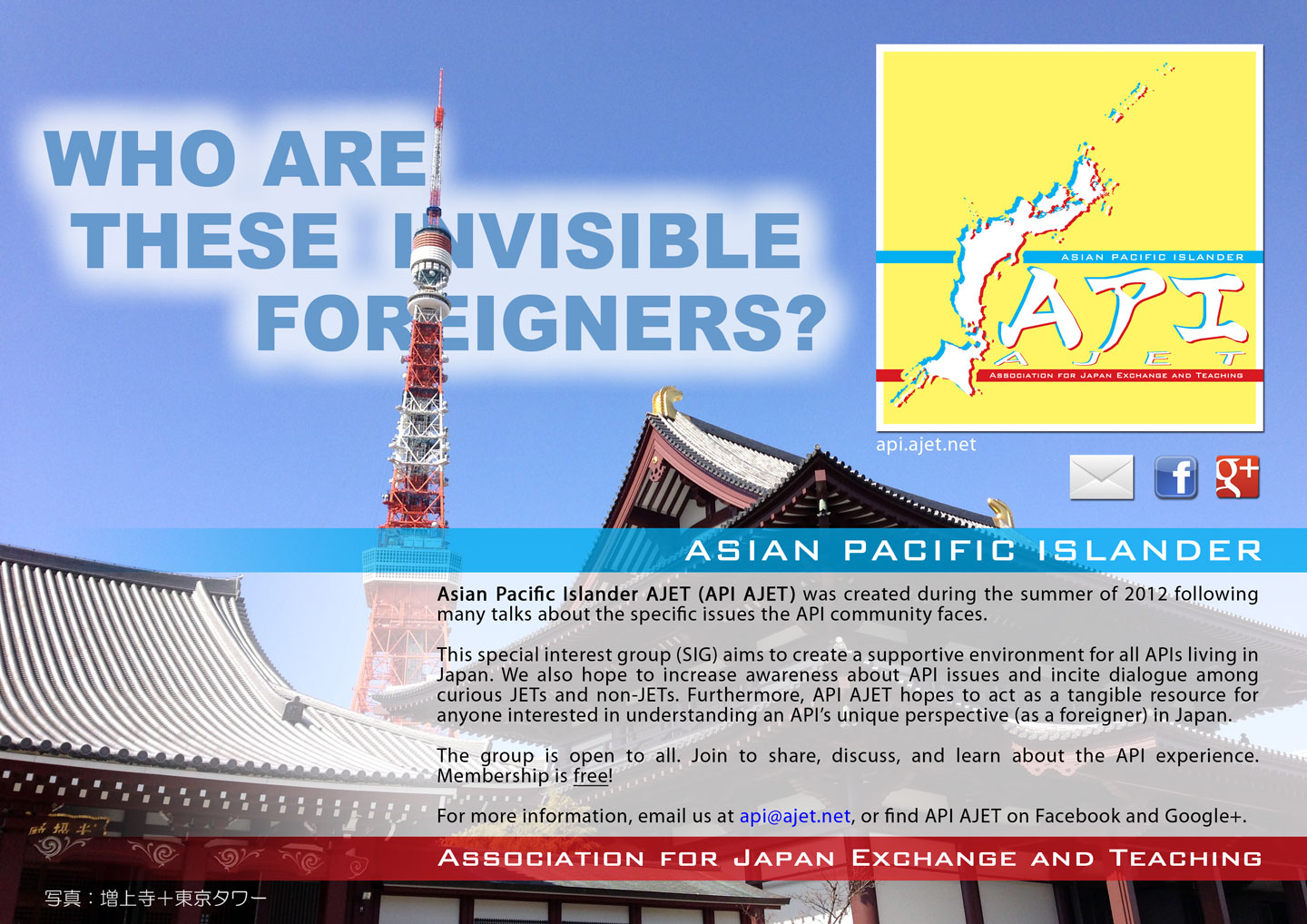
What is API AJET? How did it get started?
The Asian Pacific Islander Association for Japan Exchange and Teaching (API AJET) is a special interest group (SIG) whose mission is to provide peer support for the Asian Pacific Islander (API) community in Japan, as well as to raise local and global awareness about the diverse range of issues that face this community. The group is open to any and all who wish to share experiences and/or promote cross-cultural understanding through discussions, events, activities, etc.
During the early summer of 2012, Albert David Valderrama (Ibaraki Prefecture, 2010) realized a growing concern. Some foreigners of Asian descent–his friends and acquaintances–were having difficulties adjusting to Japanese life. He wanted to do something to help but was unsure on exactly what or how. At the time, a Program Coordinator from the Council of Local Authorities for International Relations (CLAIR) suggested that he contact a representative from the Association for Japan Exchange and Teaching (AJET) about starting a Special Interest Group (SIG).
After coming to Japan, Melody Wong (Okayama Prefecture, 2011) and Valderrama immediately realized that they had been experiencing a very different life than what the generic descriptions made people believe; however, even among the two, there was still a major distinction. The disparity was that Valderrama had been provided essays in the 2010 General Information Handbook and a specialized workshop during the 2010 Tokyo Orientation geared towards ‘JETs of Asian Descent’. This cultural help was unavailable beginning in 2011, when Wong arrived, and has not been reintroduced into the orientation process ever since, contributing to the concern Valderrama had had earlier that summer.
Realizing that such aid was still needed within the JET community, and the foreigner community in general, the two co-founders decided to use their combined experiences to create a support group for the Asian Pacific Islander (API) demographic in Japan. They hoped to alleviate any stress and help people cope with any issues that might stem from being an API foreigner in a mostly homogeneous Asian nation.
In the fall, the group started to evolve from a notion to an official AJET SIG. After speaking with an AJET Block Representative to get in touch with the AJET Activities Coordinator, the idea began to grow. In conjunction with help from a handful of other JETs in various parts of Japan, the concept gained more awareness and support. After the Mission Statement and Constitution were completed, National AJET approved the SIG in December of 2012. Thus, API AJET was born.
Can you explain the significance behind your banner? Was the map of Japan intentionally placed upside down?
Yes, the map was intentionally placed upside-down. It was visually appealing, and it represents looking at Japan from a different perspective with the idea that we may have been looking at it from the wrong direction all along, while simultaneously saying that we’re aiming to turn things around. The red and blue creates a false 3D effect, which symbolizes having multiple dimensions. And the yellow is to take over the stereotypical skin color associated with Asians in the west.
What kind of activities is API AJET involved in? How can JETAADC show support or get involved?
In addition to having a Facebook group where members can share experiences, post articles, and hold discussions, with the help of block representatives around the country, API AJET also organizes events and casual get-togethers where members can meet each other and interact, such as an API coffee chat and a screening of a documentary about the mixed-race experience in Japan, ‘Hafu’.
API AJET also publishes a webzine, @API, in which members contribute articles, poetry, reports, and more related to their experiences as API JETs in Japan (@api can be accessed in full at http://issuu.com/apiajet or in blog form at http://apiajet.wordpress.com/). The webzine has also featured interviews with both current JETs and alumni, and we welcome any submissions or articles from JET alumni who have experiences or creations to share.
Please send any questions, comments, or submissions to api@ajet.net.
Facebook: https://www.facebook.com/groups/514450868579321/
Blog: http://apiajet.blogspot.jp/
@api (webzine): http://issuu.com/apiajet or http://apiajet.wordpress.com/
Twitter: https://twitter.com/apiajet


Leave a Reply